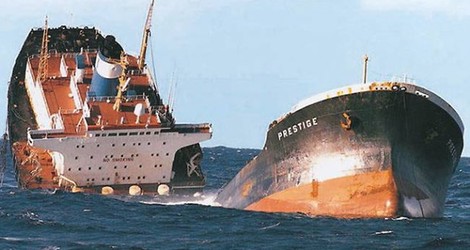Your podcast discovery platform
Curious minds select the most fascinating podcasts from around the world. Discover hand-piqd audio recommendations on your favorite topics.

piqer for: Climate and Environment Global finds Globalization and politics
I'm a freelance journalist, currently based in Madrid. I used to be a News Producer at CNBC in London before, but I thought a little bit more sun might do me good. Now I write for several news organizations, covering a range of topics, from Spanish politics and human rights for Deutsche Welle to climate change for La Marea.
The Secret Costs Of Oil
When the Prestige sank in November 2002, I was a young student of Chemistry at the University of Seville (Spain). That Christmas holiday, I travelled 1,000 kilometers north, to Carnota in Galicia, where black waves came, one after the other, breaking against the cliffs and drowning the gulls. Seeing the same place now, you wouldn't guess what happened, with the cold beaches back to their natural state.
My week as a clean-up volunteer during the Prestige disaster is my most remarkable memory of those times. I must say, it was real fun, and I think we did something impressive there. I am proud of it. But reading this article from Mark Schapiro has brought a new angle to mind. Did we help anyone else but the locals?
The people working at the beach were mostly military, and the rest of us, carrying the tons of crude oil from the beach to the tanker trucks, were volunteers. The Spanish government of Spain paid millions in subsidies to local fishermen and families, whose businesses would be ruined for years. Of course, the taxpayer also footed the medical bill for all those whose health got affected by the spill...
So exactly what part did the companies involved (the owner of the tanker and the owner of the oil) pay for?
Mark Schapiro (who covered the Prestige disaster) starts from there. He then goes on to analyze the hidden costs that the oil industry doesn't pay, from cleaning spills to curbing CO2 emissions and from lobbying foreign states to solving public health consequences.
With a brilliant mix of analytical and investigative reporting, Schapiro opens the door to environmental and economic reporters to look closer at the financial structure behind the oil industry. His angle is obviously an American one, but his conclusions and techniques can and should be used elsewhere, and not only with a focus on oil.
FULL DISCLOSURE: I know Mark Schapiro personally. He was a professor during my MA at the Danish School of Journalism, where he taught a course in Analytical Journalism.
Stay up to date – with a newsletter from your channel on Climate and Environment.
